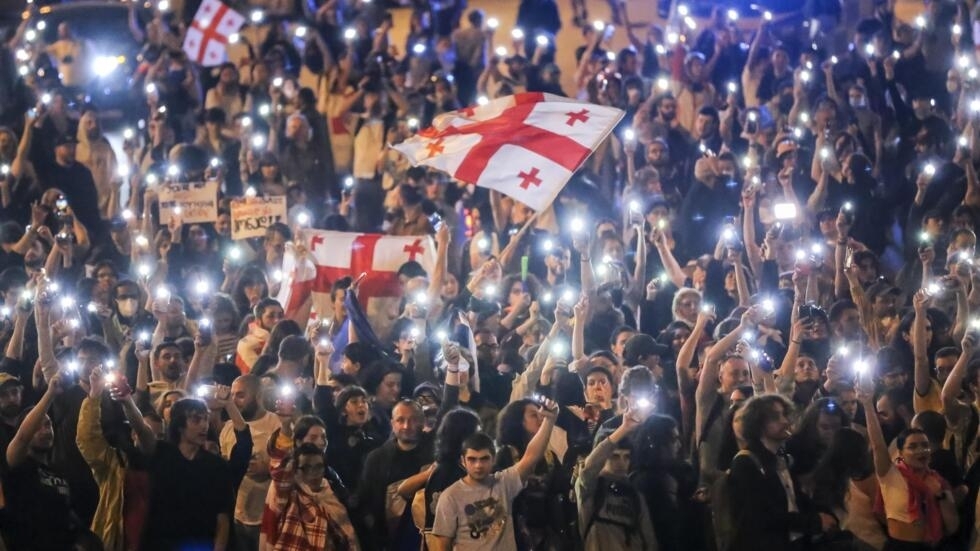Georgia's European trajectory shows troubling signs of backsliding, following the adoption of the controversial "Law on Transparency of Foreign Influence" by lawmakers from the ruling Georgian Dream (GD) party. The law, dubbed as the “foreign agents’ law” and “Russian law”, was rushed through the parliament on 14 May. The session lasted only a minute and a half, amidst a backdrop of protests and violent scuffles with riot police.
In fact, the situation feels like déjà vu. In February 2023, the ruling party initially introduced a similar bill, which sparked widespread protests and was subsequently withdrawn. Promises were made not to reintroduce the bill; however, just a year later, the same contentious legislation has reemerged, albeit repackaged, yet it remains highly problematic. This happened after Georgia had been granted candidate status by the European Council in December 2023.
The rapid passage of this law, and without waiting for the legal opinion of the Venice Commission of the Council of Europe, has triggered alarm both domestically and internationally, drawing sharp criticism from Western allies and casting doubt on Georgia's dedication to its European Union ambitions. The EU reacted quickly on 15 May with High Representative Josep Borrell issuing a statement with the Commission stating that the adoption of law negatively impacts Georgia's progress on the EU path.
Why the law is problematic
The law in itself is not necessarily dangerous but includes troublesome language and contentious sections. If Georgia were a robust democracy, a modified version of the law could be advantageous. However, in the absence of crucial checks and balances, and with a judiciary that is under the control of an excessively powerful executive branch, this law could easily become a tool for repressive actions against the opposition and civil society, similar to those in Russia.
The law requires any civil society or media organization receiving at least 20% of its funding from foreign sources to register as an entity "serving the interests of a foreign power." This not only stigmatizes such organizations but also poses a threat to the Georgian society as a whole, potentially polarizing it further and fostering radicalization.
Article 8 of the law grants the government extensive powers to monitor and interfere in the operations of these organizations without sufficient oversight, leading potential abuses of power reminiscent of those in authoritarian regimes. The Minister of Justice is given broad discretion to surveil these entities based on vague criteria, a move that could infringe on privacy rights and chill freedom of expression.
Implications for EU-Georgia relations
Furthermore, Georgia's emerging troubles with the EU are not linked only to this law. Lawmakers of the ruling party have also hastily enacted legislative changes in a law on offshore financing. The move has sparked concerns that the country could become a tax haven for illicit funds, potentially benefiting the billionaire party leader.
The tax code amendments, fast-tracked on April 19, simplify the process for offshore capital to enter Georgia. It was criticized by the European Bank for Reconstruction and Development (EBRD) president, who remarked that the offshore law is "not moving in the right direction."
Another problematic law, passed on April 4, saw the Georgian parliament swiftly eliminate mandatory gender quotas from the Electoral Code, which previously required that every party list include at least one woman for every four candidates.
These tensions emerge at a pivotal time in Georgia’s domestic politics and its relationship with the EU. After having achieved EU candidate status, Georgia was set to make substantial progress toward EU membership—a goal that seemed nearly unattainable just a few years earlier. This year, by fulfilling the EU’s conditions, Georgia could realistically have expected a genuine opportunity to initiate accession talks.
However, the recent developments threaten this prospect. In particular the “transparency of foreign influence” law does not comply with the criteria for progress, including the protection of human rights and the freedom of civil society and media. The legislation also contradicts the Copenhagen accession criteria, which require stable political institutions and adherence to the rule of law.
Beyond the recent legislative changes, the overall approach of the Georgian Dream party exposes not just a policy mismatch but also a significant discrepancy in the Georgian government's theoretical commitment to EU integration.
On one hand, the government proclaims its intention to join the EU by 2030, implying that the ball is now in the EU's court to make this a reality. On the other hand, the Green Dream party's rhetoric amplifies domestic narratives that accuse the West of destabilizing Georgia and mirrors Kremlin officials' and pro-Russian factions' claims of a Western conspiracy to open a "second front" in Georgia.
Georgian Dream has also accused the West of covertly funding protests and backing the opposition, portraying these actions as infringements on Georgia's sovereignty.
Looking ahead to elections
EU-Georgia relations are currently strained, and predicting what might happen is challenging as the situation continues to evolve. Unlike the US, which has been more vocal about potential punitive measures, the EU has until now opted for a more cautious approach. The EU's foreign policy chief criticized the law’s spirit and content as being contrary to EU norms but the EU has not announced any concrete actions against Georgia.
This hesitation reflects the EU’s dilemma in responding to Georgia’s case. Harsh measures, such as halting visa liberalization or revoking candidate status, risk alienating the Georgian population and could inadvertently reinforce the government's narrative of Western interference. On the other hand, a softer approach might allow undemocratic practices to become more entrenched within Georgian politics.
The EU is currently in a waiting mode, assessing its response based on the actions of Georgia's ruling party. If the party agrees to withdraw the controversial law following intense international pressure – including from the European Commissioner for enlargement who a known as friendly to the government - relations could recover, and Georgia's EU integration process might return to a positive trajectory.
If the law remains in force and threatens the integrity of civil society and media, the EU may be compelled to take a more stringent approach.
Another important factor is the upcoming parliamentary elections in October. The outcome of the elections will largely define the future of EU-Georgia relations but is difficult to predict. The ruling party, Georgian Dream, holds a tight grip on power while the opposition remains fragmented.
While EU-Georgia relations have undoubtedly suffered, reports of the death of Georgia's EU perspective are exaggerated. With the Georgian population's support for EU membership, and a positive record of challenging governments that have shown authoritarian tendencies, the only viable path forward for Georgia should lead towards EU membership. The choice on the way forward is in Georgia's hands, as the EU statement said.


